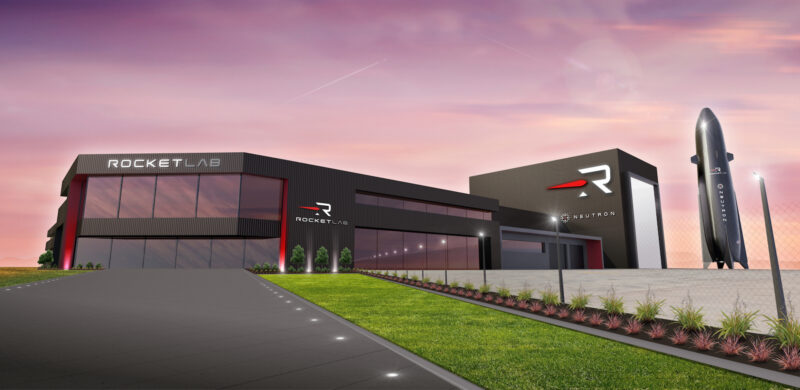Latest News

A rendering of Rocket Lab’s Neutron Production Complex to be built in Virginia. Photo: Rocket Lab
Rocket Lab is cementing its presence on the East Coast of Virginia, selecting Wallops Island as the launch and landing site for its new reusable Neutron rocket, after a competitive process to find a location. The comprehensive deal with the state, backed up by $45 million in development funding from Virginia, also includes manufacturing and operations facilities.
Monday’s announcement comes after extensive development efforts between Rocket Lab and NASA, a close relationship over the years that has helped accelerate CEO Peter Beck’s vision for the future of space. The 250,000 square foot Neutron manufacturing complex will be located near Launch Complex 2, which is Rocket Lab’s new launch site for the Electron rocket.
Beck began a zoom press conference on Monday with a palpable sense of excitement about the deal. He acknowledged that this was “perhaps the industry’s worst kept secret” because of his current working relationship with Wallops to develop a launch site for the Electron rocket, with the first Electron launch there expected sometime later this year.
The Neutron launch pad will be located on the southern end of Wallops Island, which Beck said enables close proximity to the new production complex and offers efficiencies in getting the rocket ready for a subsequent launch. The size of the production facility will be large enough to handle the entire rocket, Beck said, which was an early design decision.
“The manufacturing of the stages is close to the launch site, which has created huge advantages for not just manufacturing but ongoing maintenance and launch of the vehicles,” Beck said. “There will be whole rockets rolling out. The complex will also include automated fiber replacement robotic production systems, and this is pretty cool because they can lay up meters of Neutron’s carbon composite structures in just minutes. It’s incredible.”
David Pierce, director of NASA’s Wallops Flight Facility, said that Rocket Lab is helping shape history through expanding launch at Wallops. “It’s not an exaggeration to say that Rocket Lab’s legacy at Wallops will be to transform the space economy on the Eastern Shore, and promote manufacturing and aerospace supply chains jobs,” Pierce said.
Virginia will support the development with $30 million for infrastructure and operational systems improvements to the Mid Atlantic Regional Spaceport (MARS). Another $15 million will come from the General Assembly’s Major Employment and Investment Project Approval Commission for site improvements and building construction in support of Neutron.
Retired U.S. Air Force Major Ted Mercer, the new CEO and executive director of MARS said authorization for the funds is working through Virginia’s legislation and must be blessed by the legislature before it can be accessed.
Since there’s no indication that the legislature will be slow on funding authorization, Beck said that the development of the complex will be on a fast track. “We have no time to lose here,” he said. “We need to get Neutron flying [by] 2024. We’ll be looking to break ground here extremely shortly. You won’t have to wait long to see some holes in the ground and things going on there.”
Neutron’s first flight will be an orbital attempt, Beck said, and the first landing will be a downrange landing. “We expect to spend some time getting that [downrange landing] right before we start doing return to launch site, land-based landings.”
Beck said the development program is on a tightly phased pace to ensure that the infrastructure is there when it is needed.
MARS is already getting things ready now, according to Mercer. “We are already beginning to lean forward in preparing the 20 acres that we already own where this facility would go,” he said. “We’re already doing the preparatory work. There’s environmental work that has to be done, clearing the land, systems have to be put in, ground systems have to be put in, all that kind of work we are already beginning.”
Rocket Lab expects to begin construction promptly once it receives approvals and clearances, driven in part by the need for more rocket launches by interested military and commercial operations.
The Neutron rocket is set to be the world’s first carbon composite large launch vehicle, designed as a tapered rocket with a wide base that provides for stable landing without the need for landing legs. The balanced rocket will not need a bulky launch site infrastructure, including a launch tower, since it is balanced enough to stand on its own. It’s designed to fly satellite mega-constellations, deep space missions and human spaceflights.
The interest in Neutron by commercial and government includes a recent $24 million development contract granted by the U.S. Space Force Space Systems Command for national security and defense missions. Further Neutron expansion is expected to continue throughout the U.S. as the Neutron rocket moves towards its first launch.
“Virginia’s industrial and innovation ecosystem and skilled workforce make the commonwealth [of Virginia] an optimal location for industry leaders like Rocket Lab. This important project reinforces the Eastern Shore’s legacy as an aerospace hub that offers the infrastructure for manufacturing and developing new technologies, and we look forward to a long partnership with Rocket Lab,” Virginia Governor Glenn Youngkin said in the press release.
Stay connected and get ahead with the leading source of industry intel!
Subscribe Now